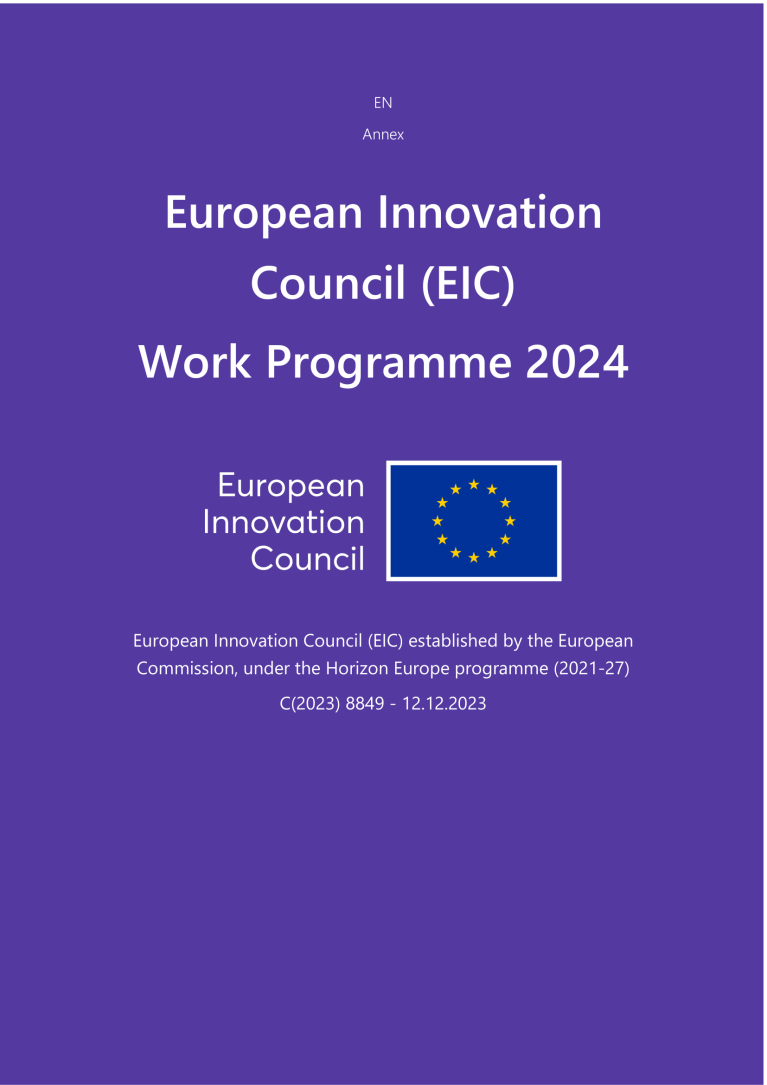Which instrument is right for me?
The overall objective of the EIC Pathfinder for advanced research is to develop the scientific basis to underpin breakthrough technologies. It provides support for the earliest stages of scientific, technological or deep-tech research and development. Pathfinder projects aim to build on new, cutting-edge directions in science and technology to disrupt a field and a market or create new opportunities by realising innovative technological solutions through:
- ‘EIC Pathfinder Open’ open to support projects in any field of science, technology or application without predefined thematic priorities.
- ‘EIC Pathfinder Challenges’ to support coherent portfolios of projects within predefined thematic areas with the aim to achieve specific objectives for each Challenge.
EIC Pathfinder Challenges 2024
This page presents an overview of the different EIC Pathfinder Challenges for the year 2024. The EIC Pathfinder Challengers are described extensively in the EIC Work Programme. In case your project doesn't match any of the predefined topics, you should apply for the EIC Pathfinder Open.
2024 Pathfinder Challenges were presented by the EIC programme managers during an info day on 20 March 2024. Recordings are now available on the info day event page.
“Solar-to-X” devices
To make progress towards synthetic fuels and chemical technologies integrating all necessary conversion steps into a single device, solely and directly driven by solar energy.
Solar-to-X technologies, also called artificial photosynthesis or solar fuel technologies, support the vision of a decentralized, local energy and production system with a local provision of the needed resources. In this vision, communities become not only prosumers of electricity, but also of fuels, chemicals and materials [See work programme page 34].
Watch the challenge presentation
Pathfinder Challenges info day slide: Solar-to-X devices
- 19 FEBRUARY 2024
Towards cement and concrete as a carbon sink
To support breakthrough innovations and (alternative) pathways for decarbonised and carbon-negative cement and concrete.
Cement and concrete are versatile, low-cost, abundant and relatively local. Modern societies are hard to imagine without these materials. Realistically, cement and concrete are here to stay. Then again, current mainstream cement and concrete technologies are also the source of 8% of our CO2 emissions (about 600 kg per capita), which are “embodied” in our buildings and infrastructures. Roughly 60% of these emissions are “chemical” released by converting limestone into clinker, and 40% of doing so at very high temperatures by burning fossil fuels. With EU (and global) commitments for rapid and radical emission reductions, it is necessary to pull all scientific, economic, and regulatory levers to reduce the environmental impacts of the cement and concrete sector [See work programme page 37].
Watch the challenge presentation
Pathfinder Challenges info day slide: Towards cement and concrete as a carbon sink
- 19 FEBRUARY 2024
Nature inspired alternatives for food packaging and films for agriculture
To support interdisciplinary research leading to the development and production of sustainable nature inspired alternatives for food packaging and agricultural production such as, but not limited to, greenhouse and mulch films.
To replace the use of fossil-carbon-based plastics from farm to fork and thereby support EU policy ambitions to move towards a more circular, resource efficient economy.
This Pathfinder Challenge aims to support ambitious interdisciplinary research that will lead to the development and production of sustainable nature inspired alternatives for food packaging and agricultural production such as, but not limited to, greenhouse and mulch films. These materials must have a reduced environmental impact, through design and production, while delivering the functional characteristics of plastics [See work programme page 41].
Watch the challenge presentation
- 19 FEBRUARY 2024
Nanoelectronics for energy-efficient smart edge devices
To explore solutions that will have a drastic impact on decreasing the power consumption of any smart edge device, especially for Edge Processing and memories, Edge Sensing and Imaging, Edge Communication and Edge Power Management.
The overall objective of this challenge is to explore solutions (starting at TRL 1/2) that will have a drastic impact on decreasing the power consumption of any smart edge device, but specially for Edge Processing and memories, Edge Sensing and Imaging, Edge Communication and Edge Power Management. The proposed solutions should start at TRL 1-2 and reach TRL 3-4 [See work programme page 44].
Watch the challenge presentation
Pathfinder Challenges info day slide: Nanoelectronics for energy-efficient smart edge devices
- 19 FEBRUARY 2024
Strengthening the sustainability and resilience of EU space infrastructure
To support the development of innovations strengthening the protection of EU space infrastructure.
To develop technologies for space debris mitigation and active debris removal and concepts for in-space recycling of dysfunctional orbital assets.
The ever-growing orbital population of satellites and space debris poses increasing challenges to space infrastructure. The density of space objects amplifies the risk of orbital collisions, unexpected fragmentation events and re-entries that may result in the degradation of space assets, hindering the services they deliver and, thus making Earth orbits unusable. Debris growth is escalating with more than 2,500 non-operational satellites, 36,500 space debris pieces bigger than 10 cm and 1 million pieces of debris between 1-10 cm in Earth’s orbits. Collision avoidance manoeuvres for satellite owners has doubled and is expected to grow. Continuous trajectory changes of spacecraft will result in insufficient fuel for deorbiting, critical end of life spacecraft manoeuvres and any other remediation or in-space mobility activities. In-space recycling of dysfunctional orbital assets will provide an opportunity for space assets re-utilisation and in-space refuelling. This challenge addresses the long-term emerging need for green, compact and affordable de-orbiting solutions and in-space recycling of space debris [See work programme page 46].
Watch the challenge presentation
- 19 FEBRUARY 2024
EIC work programme 2024

- General publications
- 12 December 2023
The European Innovation Council work programme 2024 opens funding opportunities worth over €1.2 billion for strategic technologies and scaling up companies. The majority is dedicated to SMEs and start-ups to develop and scale up “deep tech” innovations in critical fields such as generative artificial intelligence (AI), space, critical raw materials, semiconductors and quantum technologies.
